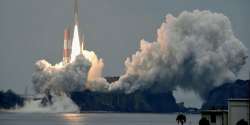The Japan Aerospace Exploration Agency (JAXA) and Mitsubishi Heavy Industries today launched the latest version of the H-IIA rocket from the Tanegashim Island Space centre in Kagoshima, carrying a communication satellite with a local version of the U.S. global positioning system (GPS) called Michibiki 2.
The GPS is expected to increase the precision of location information used in smartphones and car navigation system.
Michibiki 2 is Japan's second Quasi-Zenith satellite, which is a device designed to improve global navigation and augment signals emitted by the US GPS, Efe news reported.
Japan launched the first Michibiki satellite into space in 2010 on a trial basis and it plans to send two more satellites later this year, according to the Cabinet Office.
Once the four satellites are in orbit, at least one satellite will be flying over Japan for eight hours per day.
Combining with the U.S. GPS, the Japanese system will enhance the stability of receiving radio waves and increase the precision of position information.
The U.S. GPS has a margin of error of about 10 metres but together with the Japanese system positioning, the margin for error will be reduced to only several centimetres.
The Japanese government also plans to use these satellites to establish a network to improve communication efficiency when traditional networks stop functioning due to natural disasters.
The objective is to avoid a situation similar to what occurred after the earthquake and tsunami on March 11, 2011, which left some 29,000 mobile phones and over 1.9 million landline phones disconnected, hindering search and rescue operations.
Japan plans to start testing the system in 2018 and by fiscal 2023 the government plans to have launched a total of seven satellites into orbit and secure Japan's own GPS system without depending on the U.S. system.
The system will enable smartphones of people affected by natural disasters to communicate with the security forces, firefighters, hospitals or the Japan Meteorological Agency (JMA) through text messages.
Latest World News
